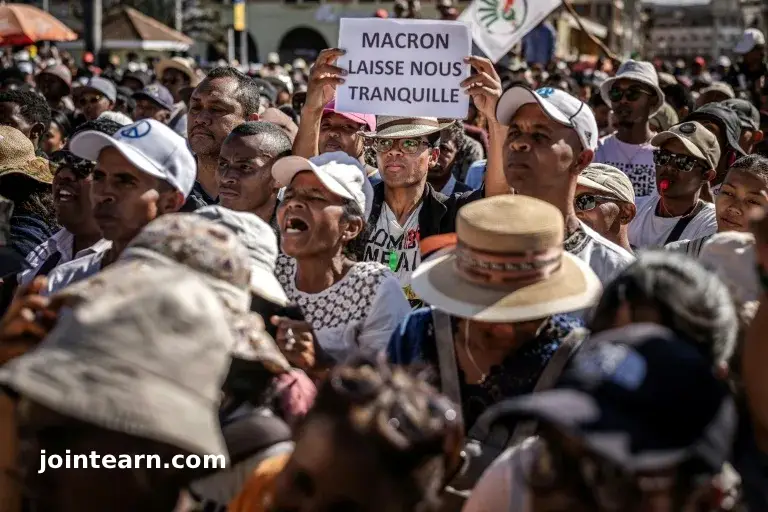
Rising public anger in Madagascar has turned its focus toward France, the island’s former colonial ruler, as widespread protests against impeached President Andry Rajoelina have exposed deep resentment over alleged French interference in Malagasy politics.
Placards reading “France Out!” and “Rajoelina and Macron Out!” filled the streets of Antananarivo this week, after reports surfaced claiming that Rajoelina fled the country aboard a French military aircraft amid mounting political chaos and military defection.
“They are still colonising us even though we are supposed to be independent,” said 26-year-old engineer Koloina Andrianina Rakotomavonirina at a protest in the capital. “It’s unfair that they intervene in such a matter.”
The protests followed the National Assembly’s impeachment of Rajoelina on Tuesday for “desertion of duty,” after the president disappeared from public view as the military unit CAPSAT seized control of key government facilities.
Colonial Tensions Resurface Amid Political Turmoil
Political experts say the anger toward France is unsurprising, given the country’s painful colonial past. Christiane Rafidinarivo, a political scientist based in Paris, told AFP that anti-French sentiment is deeply rooted in Madagascar’s collective memory.
“France represents colonialism,” Rafidinarivo said. “This perception runs through public opinion and is triggered depending on current events.”
France ruled Madagascar from 1896 until independence in 1960, leaving behind a legacy marked by the brutal repression of the 1947 Malagasy uprising, which resulted in tens of thousands of deaths.
The latest wave of protests has revived those old wounds, with demonstrators accusing Paris of meddling in Madagascar’s domestic politics and supporting unpopular leaders in exchange for economic and strategic influence.
Macron Faces Backlash Over Alleged French Involvement
The anger intensified after French media reports alleged that Rajoelina had been evacuated on a French military plane, though the Élysée Palace has refused to confirm or deny the claim.
Adding to the controversy, President Emmanuel Macron’s office announced the pardon of two French nationals imprisoned in Madagascar on coup-related charges — coinciding with the reports of Rajoelina’s disappearance.
This sequence of events fueled suspicions of a covert deal between Rajoelina and Paris, further tarnishing France’s image on the island.
Dual Nationality Scandal Deepens Distrust
Rajoelina’s ties to France have long been contentious. In 2023, it was revealed that he had acquired French citizenship nine years earlier — a disclosure that outraged the opposition and led to calls for his disqualification from the 2023 presidential race under Malagasy nationality laws.
Despite the controversy, Rajoelina won reelection amid a boycott by opposition parties and historically low voter turnout, which critics described as “a democratic farce.”
Political analyst Adrien Ratsimbaharison, author of a book on Madagascar’s 2009 coup, said the scandal reinforced public perceptions of France as a behind-the-scenes power broker.
“The opposition accused him of being a French agent,” Ratsimbaharison said. “People did not forgive France for giving Rajoelina legitimacy when Nicolas Sarkozy became the first foreign leader to recognize him after the 2009 coup.”
Historical and Economic Resentment
Many Malagasy citizens believe France has continued to benefit economically from its former colony, through lucrative contracts for French companies, call-center outsourcing, and a sex tourism industry that exploits local poverty.
“I quit my call center job because I was tired of being insulted by the French,” said 27-year-old Mampionona Razafinjoelina, reflecting a broader frustration with economic inequality and neocolonial exploitation.
A viral image on social media — falsely claiming to show French gendarmes deployed in Madagascar — added fuel to the fire, though local police later clarified that the officer in the picture was Malagasy and had only trained in France.
Macron’s Attempt at Reconciliation
Amid mounting tensions, President Macron visited Madagascar in April, promising to “create the conditions for forgiveness” over France’s colonial past.
As part of these efforts, Paris returned the remains of King Toera, a Malagasy monarch killed in an 1897 massacre, which had been held in France for over a century. Macron also announced the formation of a Franco-Malagasy historical commission to investigate colonial-era atrocities.
However, many citizens see these gestures as symbolic rather than substantive, arguing that France’s continued political influence undermines true sovereignty.
“France can’t preach reconciliation while still pulling the strings in Madagascar,” said one protester. “Forgiveness begins with respect.”
Growing Anti-French Sentiment in Africa
Madagascar’s protests reflect a broader wave of anti-French sentiment sweeping across Africa, from Mali and Niger to Gabon and Burkina Faso, where new governments have expelled French troops and sought closer ties with Russia and China.
As one of France’s last traditional allies in the Indian Ocean, Madagascar’s shifting public mood could mark a turning point in Franco-African relations, experts warn.
“Macron is losing Africa one country at a time,” said Rafidinarivo. “The anger in Madagascar shows that colonial memory is far from dead — and every crisis makes it stronger.”


Leave a Reply